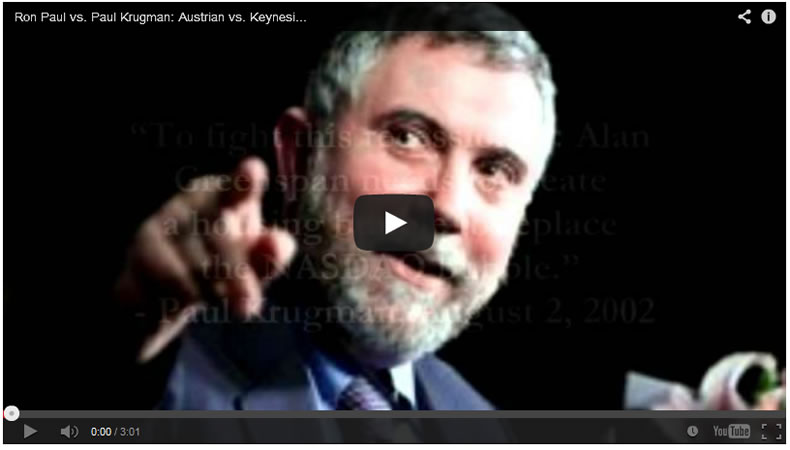Ron Paul vs Paul Krugman: True Prophet vs False Prophet
Economics / Economic Theory Nov 29, 2013 - 06:20 AM GMTBy: GoldSilverWorlds
 Isn’t it strange? We are living in the 21st century, a period of time in which people buy land on the moon, humanity has dozens of satellites providing GPS services and real time traffic information, internet brings people and information as close as one click, science and technology are making historic break throughs … but economists cannot agree on the real cause of the latest financial crash (2008).
Isn’t it strange? We are living in the 21st century, a period of time in which people buy land on the moon, humanity has dozens of satellites providing GPS services and real time traffic information, internet brings people and information as close as one click, science and technology are making historic break throughs … but economists cannot agree on the real cause of the latest financial crash (2008).
Generally speaking, there are two schools of thoughts when it comes to diagnosing the 2008 crash. One is based on free market principles and is detailed in Austrian economics. The other is based on central planning and is centered around Keynes (hence, Keynesian economics).
As noted by Barrons, journalist Jeremy Hammond had the ingenious idea of contrasting the Austrian, free-market school of economics with the Keynesian, pro-government school on the recent financial crisis through a close examination of the words of two commentators: former Congressman Ron Paul, schooled in the Austrian perspective, versus the Nobel Prize–winning Keynesian and New York Times columnist Paul Krugman. You might think a mere politician would be no match for a Nobel laureate, but in this case, think again. As forecaster, diagnostician, and prescriber, Ron Paul offers rich insights, while Krugman, true to his Keynesian perspective, gets things wrong at virtually every turn.
Hammond’s book “Ron Paul vs. Paul Krugman: Austrian vs. Keynesian Economics in the Financial Crisis“ reviews the records of Ron Paul and Paul Krugman on the question of the housing bubble. Who correctly predicted it? Who has offered the more reasonable explanation as to its cause? Who has offered the more sensible response to the bursting of the housing bubble and the financial crisis its precipitated? Most importantly, whose admonitions should we now be regarding as we move into the future? In short, who is the true prophet, and who the false?
To illustrate the objective analysis of the book, we show one of the many quotes that the author has used. This example is a quote from Paul Krugman a couple of days before the NASDAQ implosion:
In February 2000, Krugman hailed the “booming” economy and “extraordinary prosperity” the country was experiencing. As the bubble neared its peak, he commented on the view that “the whole stock market, not just the Dow, is inflated by a speculative bubble.” He said that he was “sympathetic but not entirely convinced” of this view. “I’m not sure that the current value of the NASDAQ is justified, but I’m not sure that it isn’t.” Thus, on the eve of it bursting, Krugman was still not convinced of the existence of the bubble Ron Paul had already been warning about for years.
Another illustrative example is a quote from Ron Paul after the NASDAQ crash who more or less predicts the next financial crisis based on the Fed’s monetary policy:
In October 2000, Ron Paul observed that with the ongoing financial crisis, politicians and economists were “talking about a symptom and not the cause. The cause is the Federal Reserve. The problem is that the Federal Reserve has been granted authority that is unconstitutional to go and counterfeit money, and until we recognize that and deal with that, we will continue to have financial problems.” He repeated, “we have already seen signs of economic troubles ahead” because the Fed had planned to continue its monetary inflation in answer to the financial crisis. “Without savings, true capital investment cannot be maintained,” he said. “Creation of credit out of thin air by the Fed was the original problem, so it surely can’t be the solution.”
The book is a must read for everyone who is serious about economics and looking for the truth. The book is well researched and written in an objective and unbiased way.
A special Thanksgiving discount of 81% applies till Saturday 30 November. Order now on Amazon.com for $0.99.
Get an impression of the book in this trailer:
© 2013 Copyright goldsilverworlds - All Rights Reserved Disclaimer: The above is a matter of opinion provided for general information purposes only and is not intended as investment advice. Information and analysis above are derived from sources and utilising methods believed to be reliable, but we cannot accept responsibility for any losses you may incur as a result of this analysis. Individuals should consult with their personal financial advisors.
© 2005-2022 http://www.MarketOracle.co.uk - The Market Oracle is a FREE Daily Financial Markets Analysis & Forecasting online publication.




